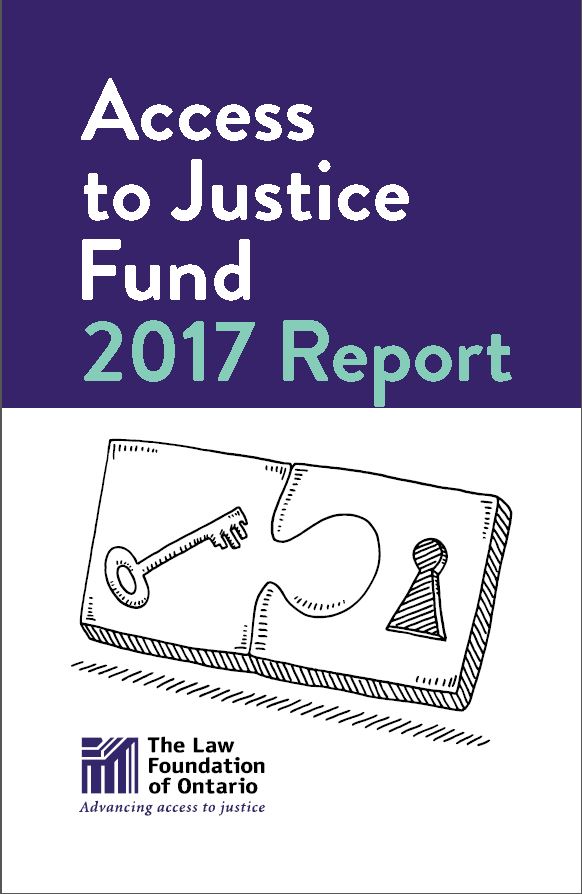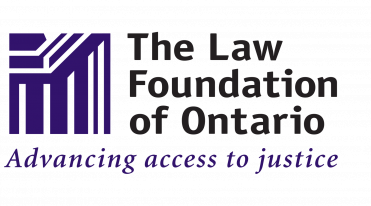The Law Foundation of Ontario is pleased to release Access to Justice Fund 2017, a new report that highlights the impact that the Access to Justice Fund (ATJF) is having in Ontario and nationally.
In fact, the Foundation is proud to have had the ATJF acknowledged by The Honourable George R. Strathy, Chief Justice of Ontario, in his remarks at the Opening of the Courts for Ontario ceremony yesterday. Saying that there is “much to celebrate in our justice system”, Chief Justice Strathy cited the ATJF as an example that is “bringing real access to justice to the people of Ontario”.
“The ATJF is inspiring,” says Linda Rothstein, the Foundation’s Board Chair. “In project after project you see the grassroots and the professions collaborate and deliver timely and practical legal help to people who are most in need. Together, and supported by the ATJF, they’re making an impact, and directly helping people in communities across Canada.”
 Access to Justice Fund 2017 Report: some highlights
Access to Justice Fund 2017 Report: some highlights
The ATJF is a distinct and permanent fund that was created in 2009 after the Foundation received its first cy-près award. The projects supported through the ATJF epitomize how community-based groups and the legal professions are working together to tackle some of our country’s most pressing legal issues. The following projects are highlighted in the 2017 report.
Self-represented litigants can struggle within the family law system. From a single courthouse pilot project to the expansion to 14 Canadian cities, the ATJF has supported Pro Bono Students Canada’s Family Law Project. It coordinates law student volunteers to help people navigate the family law court processes.
“At some point in our lives, many of us will need to deal with separation or divorce, child custody arrangements, or a protection order. The stakes are high, the court processes may appear daunting, and many Canadians do not have full legal representation,” said Alison Symington, Acting PBSC National Director. “PBSC’s Family Law Project provides practical help to individuals in such situations.”
Divorce and child custody issues can be distressing enough. Factor domestic violence into the mix and the situation is much more complex and precarious. Legal services are supported through an ATJF grant to Luke’s Place, a women’s organization in Oshawa.
“The enhanced legal services has had an undeniably positive impact on women and children in our community who may have otherwise fallen through the cracks,” said Lindsay McKay, Luke’s Place Legal Services Director. “The women who use the services are leaving abusive relationships and do not qualify for legal aid certificates, yet do not have the means to retain their own lawyer. Without the enhanced legal services and pro bono clinic the women and children served would have to navigate the stressful and complex family court system with limited to no access to timely legal advice, emotional support and community resources.”
A special focus of the ATJF is to address the overrepresentation of Indigenous people in our criminal and child protection systems. In one grant, the Elizabeth Fry Society of Ottawa hired a peer support worker, who was Indigenous, to provide a range of supports to women who had been imprisoned and were released under supervision or were at risk of criminalization. Close to 800 women have been helped through the project to date.
“Client survey results indicate extremely positive outcomes in supporting Indigenous women through individual and group counselling and support to avoid re-incarceration, integration into the community, and ongoing support while in jail”, said Ann McSweeney, Executive Director of the Elizabeth Fry Society of Ottawa. “Women refer to our support as ‘not a hand out but a hand up’.”
In response to a condition in a cy-près award, the ATJF helped address the significant gap in knowledge, protection, and access to services for investors in Canada, especially for vulnerable investors. The ATJF helped establish the first investor rights legal clinic in Canada as a partnership between Osgoode Hall Law School and FAIR Canada.
“Investors who have experienced harm often do not know where to turn for information and advice and there are few services available to them,” said Poonam Puri, Osgoode Hall Law School Professor and founder of the clinic. “With this clinic, law students, with appropriate supervision, will assist investors with their real life problems. They will develop specialized skills, advanced knowledge of investor recovery mechanisms, and identify gaps in the current regulatory framework.”
Since 2010, the Foundation has made more than 185 grants for over $20.4 million from the ATJF. Projects have provided help to many diverse groups, such as children and youth, Indigenous people, refugees, racialized groups, linguistic minorities, rural residents, and those who have experienced family violence.
Read the full Access to Justice Fund 2017 Report here or contact the Foundation at general@lawfoundation.on.ca to receive a print copy.

